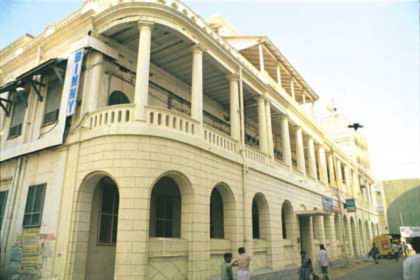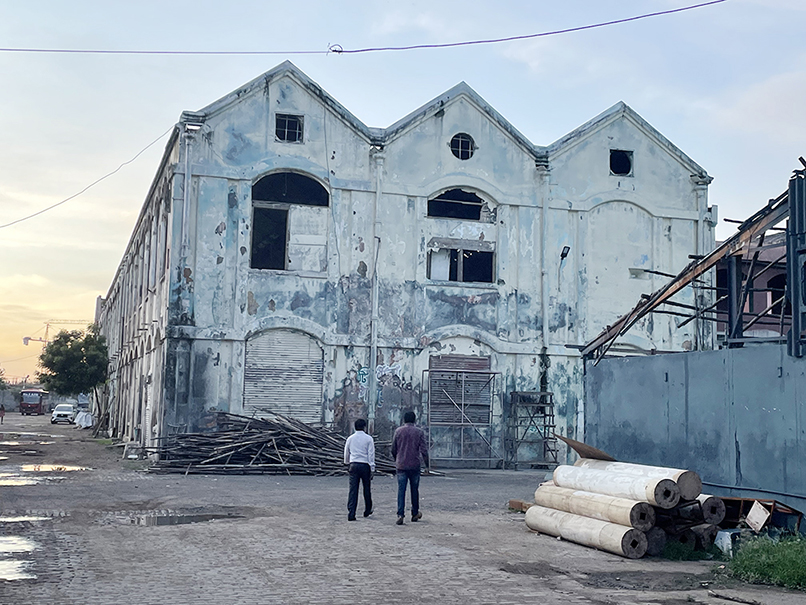Registered with the Registrar of Newspapers for India under R.N.I 53640/91
Vol XXXI No. 22, March 1-15, 2022
The Fall and Fall of Binny
Business Houses of the South by Sushila Ravindranath
Binny was the second oldest British business house in Madras, the first major business establishment in the South. The Buckingham Mills went on stream in 1878. This is from the Chief’s (S. Muthiah’s) column in The Hindu when he bemoaned the pulling down of Binny & Co’s headquarters in Armenian street in 2017.
This was not the major tragedy to strike Binny. The once premier textile and engineering conglomerate had already become a glimmer in people’s memory. Having slowly but steadily declined like most British companies of that era, its story was over by then. Various attempts to revive it had failed.
Binny’s was founded as an agency house by two Englishmen, John Binny and Keith Dennison. When it entered textiles, it was primarily as a marketing organisation exporting Pulicat handkerchiefs and Madras long cloth. Binny’s began Buckingham Mills in 1877 and the Carnatic Mills in 1883 and its textile operations began. In 1906, the Binny Group was amalgamated and it was acquired by Lord Inchcape who was a leading British industrialist.
Starting 1940, all the money-making operations of the group such as banking and insurance had to shut down. The abolition of the managing agency system was the final blow to Binnys. The Indian government tightened the screws on repatriation of funds from India. The Brtish group diluted its share holding to 42.5 per cent in 1969.
 Binny headquarters on Armenian Street (now demolished).
Binny headquarters on Armenian Street (now demolished).The rapid decline of Binny’s began after the British Group disinvested. They were still the major shareholders and they bled the company white in the 60’s. Poor liquidity and plummeting profits were not the only problems the company faced. Although many women of a certain era will always associate Binny with their fabulous chiffons and silks, the profits came from bulk clothing and school uniforms. Binny was the largest supplier of uniforms during both world wars.
At the end of the war, Binny found itself with a product mix which was out of sync with the changing times. The company could not invest in new machinery, could not introduce new products and was stuck with bulk clothing till 1974. It had to get into sarees, suitings and dress materials which it attempted.
Binny had no original ideas, tried imitating other successful textile mills and got into every textile segment late. The cost structure was high. When it went into modernisation, it invested in weaving machinery which was a major blunder. It ended up feeding modern looms with obsolete yarn. Quality started suffering and Binny was fast losing its reputation for quality.
The company inherited two other crippling legacies. The location of the Madras mill was at the mouth of the Otteri Nullah at Permbur which made it extremely susceptible to floods. Floods and cyclones caused great harm to the factory with great regularity.
Binny was very poor in handling its labour relations. The company experienced a strike almost every year. There were constant lockouts. Absenteeism always ranged between 15 to 30 per cent. The militant employees continued to push the wage bills and at one point nobody in the industry paid so much, bringing profitability down. Labour and management costs were so high that there was hardly any money left for distribution or plough back. There were too many over paid senior managers who were given colonial bungalows to stay and were served five-course meals.
 A section of the Binny Mills now.
A section of the Binny Mills now.One could not blame the Indian management alone as they were left holding a multitude of problems. There were no reserves for any kind of restructuring. Many brave attempts were made to revive the company. Financial institutions such as IDBI pitched in. Much respected industrialists such as the chairman of the TI group, AMM Arunachalam and G.K. Devarajulu, chairman, Coimbatore based Lakshmi Group, were asked to help to turn Binny around. Everybody gave up although there was a flicker of hope every now and then. By 1996 the company was finally shut down. Since then it’s been broken up and sold for its real estate value.
The liquor baron turned educationist Ramasami Udayar’s family bought Binny Mills. It became a popular space for film and TV shootings.
Last heard of, the vast land behind the Mills is being developed as a big township, a collaboration between the SPR group and Binny Mills.


Comments